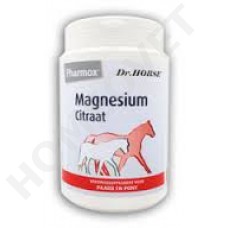Magnesium citrate for horses ( Pharmox)
Magnesium citrate for horses offers quick relief in times of stress, such as traveling or heavy training, it increases oxygen delivery to muscle tissue; it promotes muscle strength, endurance and relaxation. It is also a protectant and treatment for laminitis
Magnesium citrate offers quick relief in times of stress, such as traveling or heavy training, it increases oxygen delivery to muscle tissue; it promotes muscle strength, endurance and relaxation. Through its role in ion transport systems, magnesium affects the conduction of nerve impulses, muscle contraction and normal heart rhythm. Specially formulated for the prevention and treatment of magnesium deficiencies. It supports bone formation by regulating the absorption of calcium and is an important mineral required for normal nerve and muscle function
Magnesium Citrate Powder (Pharmox) is a highly bioavailable form of Magnesium and contains no excipients or fillers.
Magnesium is a mineral that is critical for energy production and metabolism, muscle contraction, nerve impulse transmission, and bone mineralization.
Modern diets are often low in Magnesium, and the high stress lifestyle of some horses leads to an increased need for Magnesium (traveling, breaking, training, competition etc.), Calcium-rich diets can also create an imbalance. this can cause low magnesium levels.
Low magnesium levels mean that calcium is allowed to overload the muscle and nerve cells making the nerves overly sensitive. Hormonally, there is an increase in levels of stress hormones, notably of adrenaline and cortisol.
Horses that are deficient in Magnesium show a variety of symptoms, including:
- Anxiety, spooking
- Nervousness/Flightiness
- Muscle spasms and cramps.
- Stress
- Exhaustion from training
- Back pain
- Muscle pain or weakness
- Weight loss
- Aggression
Magnesium as a protectant and treatment for laminitis
Some horses and ponies show symptoms of Equine Metabolic Syndrome (EMS) or Insulin Resistance (IR). These conditions are characterized by lumpy, abnormal fat deposits on the neck, above the tail head and on the shoulders.
These horses respond well to additional Magnesium in their diets. The extra Magnesium works best if it is given when the horse is on a low glycemic diet and, if possible, in a regular exercise program.
Dosage horse:
10 grams (4 scoops) once daily over the food.
Dosage bangs:
5 grams (2 scoops) once daily over the food.
Packaging: 500 gram
Keep out of reach of children.

 HOME
HOME OFFERS
OFFERS NEW PRODUCTS
NEW PRODUCTS SHIPPING COST
SHIPPING COST

